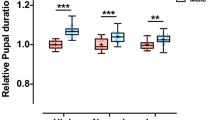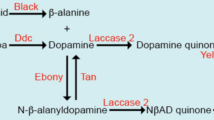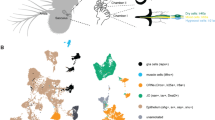Abstract
IN an attempt to elucidate the functions of the nervous system using behavioural mutants of Drosophila melanogaster, several sex-linked temperature-sensitive paralysis mutants have been isolated1,2. These mutants are reversibly paralysed at 29° C while remaining normal at 22° C. The author set out to determine the molecular basis for the paralysis in one allelic series of these mutants, shibire temperature-sensitive (shits)2.
This is a preview of subscription content, access via your institution
Access options
Subscribe to this journal
Receive 51 print issues and online access
$199.00 per year
only $3.90 per issue
Buy this article
- Purchase on Springer Link
- Instant access to full article PDF
Prices may be subject to local taxes which are calculated during checkout
Similar content being viewed by others
References
Grigliatti, T. A., Williamson, R., and Suzuki, D. T., Genetics, 64, S27 (1970).
Grigliatti, T. A., Hall, L., Rosenbluth, R., and Suzuki, D. T., Molec. gen. Genet., 120, 107 (1973).
Narahashi, T., Moore, J., and Scott, W. R., J. gen. Physiol., 47, 965 (1964).
Hinton, C. W., Genetics, 40, 951 (1955).
Author information
Authors and Affiliations
Rights and permissions
About this article
Cite this article
KELLY, L. Temperature-sensitive mutations affecting the regenerative sodium channel in Drosophila melanogaster. Nature 248, 166–168 (1974). https://doi.org/10.1038/248166a0
Received:
Issue Date:
DOI: https://doi.org/10.1038/248166a0
This article is cited by
-
Change of synapse frequency in certain photoreceptors of the honeybee after chromatic deprivation
Journal of Comparative Physiology ? A (1983)
-
Genetic modification of potassium channels in Drosophila Shaker mutants
Nature (1981)
-
Synaptic transmission reversibly conditioned by single-gene mutation in Drosophila melanogaster
Nature (1976)
Comments
By submitting a comment you agree to abide by our Terms and Community Guidelines. If you find something abusive or that does not comply with our terms or guidelines please flag it as inappropriate.



